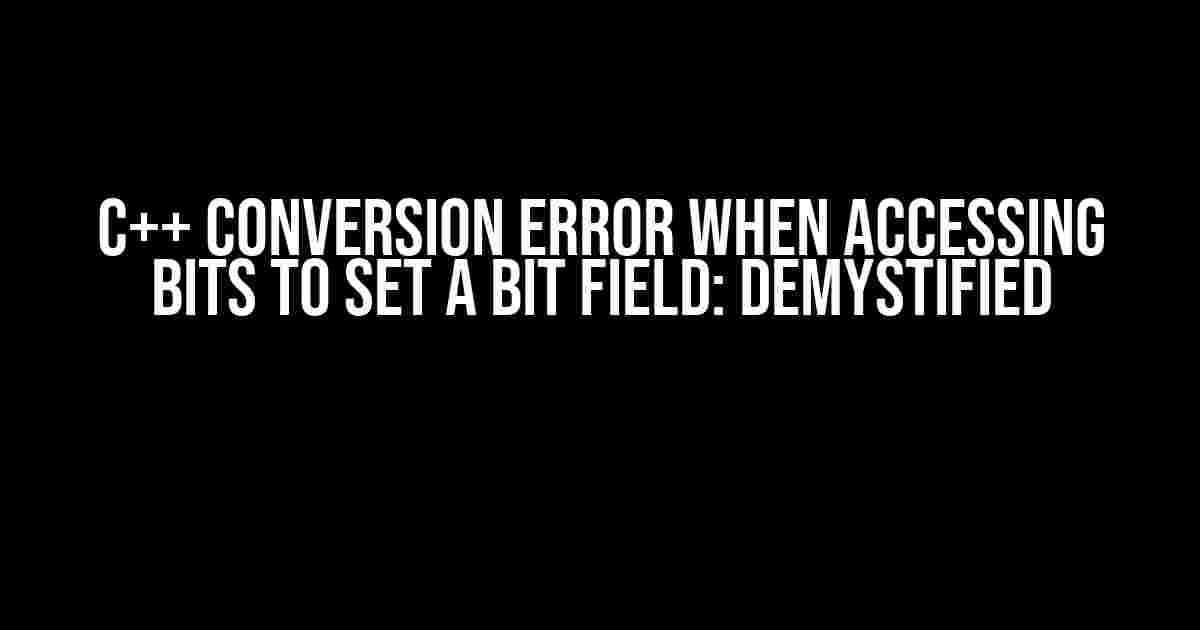Encountered a puzzling “C++ conversion error when accessing bits to set a bit field” while writing your C++ code? Worry not, dear developer! This comprehensive guide will walk you through the possible causes, solutions, and best practices to overcome this frustrating issue. Buckle up and let’s dive into the world of bit manipulation!
- What is a Bit Field?
- The C++ Conversion Error: What’s Going On?
- Solution 1: Using a Temporary Variable (The Naive Approach)
- Solution 2: Using a Type-Corrected Bitwise Operation (The Recommended Approach)
- Solution 3: Using Enum Class Underlying Type (The Modern C++ Approach)
- Best Practices for Working with Bit Fields
- Common Pitfalls to Avoid
- Conclusion
What is a Bit Field?
A bit field is a compact way to store multiple boolean or enumeration values within a single integer. It’s a space-efficient technique used in C++ programming to represent a set of flags or options. Bit fields are essential in various applications, such as configuration settings, error codes, and even in hardware programming.
Example of a Bit Field:
enum class Color {
Red = 1,
Green = 2,
Blue = 4
};
struct Pixel {
unsigned char color : 3; // 3-bit bit field to store color information
};
The C++ Conversion Error: What’s Going On?
When you try to access and set a bit field in C++, the compiler might throw a conversion error, complaining about an invalid conversion between types. This error can be frustrating, especially if you’re new to bit manipulation. The error message might look something like this:
error: invalid conversion from ‘int’ to ‘unsigned char [: 3]’ [-fpermissive]
pixel.color = Color::Red | Color::Green;
The issue arises when the compiler tries to perform an implicit conversion between the bitwise OR operation result (an integer) and the bit field type (unsigned char [: 3]). This conversion is not allowed, as the bit field type is not a standard integer type.
Solution 1: Using a Temporary Variable (The Naive Approach)
A straightforward solution is to introduce a temporary variable to store the result of the bitwise operation. This temporary variable should match the type of the bit field:
Pixel pixel;
unsigned char temp = static_cast(Color::Red | Color::Green);
pixel.color = temp;
While this approach works, it’s not the most elegant solution. We can do better!
Solution 2: Using a Type-Corrected Bitwise Operation (The Recommended Approach)
A more efficient and readable solution is to perform the bitwise operation directly on the bit field, ensuring the correct type is maintained:
Pixel pixel;
pixel.color = static_cast(Color::Red) | static_cast(Color::Green);
By casting each enumeration value to the correct type (unsigned char), we allow the compiler to perform the bitwise operation without complaining about type conversions.
Solution 3: Using Enum Class Underlying Type (The Modern C++ Approach)
In C++11 and later, you can utilize the ‘underlying type’ of an enumeration to determine the correct type for the bitwise operation:
Pixel pixel;
using underlying_type = typename std::underlying_type::type;
pixel.color = static_cast(Color::Red) | static_cast(Color::Green);
This approach is more versatile, as it adapts to the underlying type of the enumeration, making your code more portable and maintainable.
Best Practices for Working with Bit Fields
To avoid the C++ conversion error and ensure efficient bit manipulation, follow these best practices:
- Use meaningful enumeration names: Choose enumeration names that clearly represent the intended flags or options, making your code more readable and maintainable.
- Define the bit field type correctly: Ensure the bit field type matches the type of the enumeration values being stored.
- Use the correct type for bitwise operations: Perform bitwise operations using the correct type, either by casting or using the underlying type of the enumeration.
- Avoid implicit type conversions: Be explicit about type conversions to avoid compiler errors and ensure code clarity.
Common Pitfalls to Avoid
Steer clear of these common mistakes when working with bit fields:
| Pitfall | Description |
|---|---|
| Implicit type conversions | Avoid implicit conversions between types, as they can lead to compiler errors or unexpected behavior. |
| Inconsistent bit field sizes | Ensure the bit field size matches the type of the enumeration values being stored to avoid data loss or corruption. |
| Bitwise operations without type considerations | Perform bitwise operations with explicit type conversions to avoid compiler errors and ensure correct behavior. |
Conclusion
In this comprehensive guide, we’ve delved into the world of bit fields and explored the solutions to the “C++ conversion error when accessing bits to set a bit field” issue. By following the best practices and avoiding common pitfalls, you’ll become proficient in working with bit fields and writing efficient, error-free C++ code.
Remember, bit manipulation is an art that requires attention to detail and a deep understanding of the underlying types and compiler behavior. With practice and patience, you’ll master the techniques described in this article and become a C++ expert!
Frequently Asked Question
Get the inside scoop on solving that pesky C++ conversion error when accessing bits to set a bit field!
Q1: What is the most common cause of the C++ conversion error when accessing bits to set a bit field?
The most common cause is using the wrong data type or operator when trying to access and set the bit field. This can happen when you’re working with bitwise operations and bit shifts, and it’s easy to get tripped up by the nuances of C++’s type system.
Q2: What is the difference between bitwise AND (&) and logical AND (&&), and how does it relate to bit fields?
The bitwise AND (&) operator performs a binary operation on two numbers, whereas the logical AND (&&) operator evaluates two boolean expressions. When working with bit fields, you need to use the bitwise AND operator to perform the correct operation. For example, `flags & FLAG_MASK` would check if the `FLAG_MASK` bit is set in the `flags` variable.
Q3: How do I set a specific bit in a bit field using C++?
You can set a specific bit in a bit field by using the bitwise OR operator (|) with a mask that has the corresponding bit set. For example, `flags |= FLAG_MASK` would set the `FLAG_MASK` bit in the `flags` variable. Make sure to use the correct bitwise operator and mask to avoid accidentally setting or clearing other bits!
Q4: What is the purpose of using an enumeration (enum) when defining bit fields in C++?
Using an enumeration (enum) when defining bit fields in C++ helps to improve code readability and maintainability. Enums allow you to assign meaningful names to specific bit values, making it easier to understand the intent behind your code. Additionally, enums can help prevent errors by ensuring that only valid bit values are used.
Q5: What is the best way to avoid C++ conversion errors when working with bit fields and bitwise operations?
To avoid C++ conversion errors when working with bit fields and bitwise operations, make sure to use the correct data types and operators. Always use unsigned integers (e.g., `uint8_t` or `uint16_t`) when working with bitwise operations, and be mindful of the data type promotions and conversions that occur during these operations. Additionally, use meaningful names and enums to make your code more readable and maintainable.



